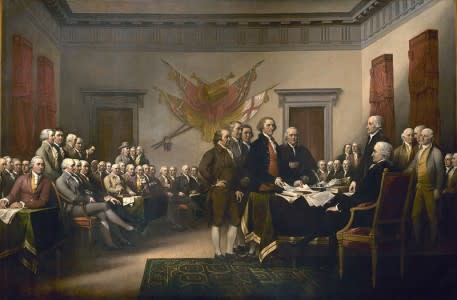A few facts about public polling and the Founding Fathers
A Gallup poll released on Independence Day has an eye-catching concept: the Founding Fathers would dislike today’s America. But did the survey group actually understand the people who founded this country, before they answered the question?
The answer is: probably not.
The Gallup folks didn’t ask the second question. Instead, they posed the following one:
“Overall, do you think the signers of the Declaration of Independence would be pleased or disappointed by the way the United States has turned out?”
It turns out that 71 percent of people said the Founders would be disappointed in the current nation, compared with 48 percent in 2003.
A similar poll from Fox News last month had similar results.
“Do you think the Founding Fathers would approve or disapprove of how things are going in Washington these days?” The response: 82 percent said the Founders would disapprove.
The follow-up question was, “Do you believe the United States would be a better country if we followed the ideas of the Founding Fathers and the Constitution more closely — or not? The response: 76 percent said Yes.
Of course, the people answering these questions have their own perceptions of history, the Founding Fathers and the Constitution, and the track record of Americans—when it comes to understanding basic history in recent years—hasn’t been good.
For example, in 2011, the Daily Beast gave 1,000 people the basic citizenship test, and 38 percent failed.
It’s not hard to find other examples where people, like those in the Gallup and Fox News polls, struggle with basic American history facts and concepts.
A 2010 poll from the Lexington Group included these factoids:
Many more people knew that the song “Beat it” was written by Michael Jackson than knew that the Bill of Rights was part of the Constitution, while 60 percent of people knew the number of children in TV’s Gosselin family, while only 11 percent could name the first chief justice of the Supreme Court.
A 2010 study from the National Assessment of Educational Progress showed that just 12 percent of high school seniors were considered “proficient” in American history.
In August 2012, Roper polled 1,000 American young adults with college degrees about topics such as the federal government, the Supreme Court and the Constitution.
About 47 percent struggled with a question about basic First Amendment freedoms, 59 percent couldn’t correctly identify the Emancipation Proclamation, and only 20 percent of people could identify James Madison as the Father of the Constitution.
So how would all this sit with the Founding Fathers? Nine years ago today, PBS interviewed three prominent historians and journalists about these very topics.
“I think the Founders would be very pleased by the power and the prosperity of the country. I think that they would be somewhat dismayed by the nature of political discourse,” said Ron Chernow, with a balanced answer.
Richard Brookhiser had a blunter response.
“I think the Founders would find our politicians and our voters pretty dumb. I mean, we have two Yale men running for president now, but I don’t think they can translate Greek into Latin, and back, which, you know, anyone who went to a college in those days was required to be able to do,” he said.
“And, you know, I’m not just laughing at George W. Bush and John Kerry. I think they would have this disdainful attitude towards we, the voters, as well.”
So maybe the answer to the question is that the Founding Fathers would be disappointed, but not for the implied reasons in the Gallup and Fox polls.
Recent Historical Stories
How much do you know about the American flag?
Did Abraham Lincoln omit God from the Gettysburg Address?
10 facts about Thomas Jefferson for his 270th birthday
10 interesting birthday facts about James Madison


